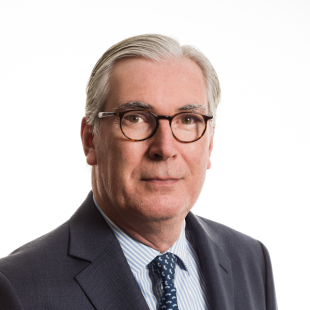
Authors
Client expectations of the lawyers and law firms they instruct have never been more fluid as globalisation, technological advancement, risk management and regulatory pressures create new commercial challenges. The need to keep pace with ast-moving global markets and pressure on time mean ‘in-depth opinion’ is increasingly making way for ‘preliminary views’. In short, the role of the business lawyer has changed immeasurably since business law firms began to globalise in the 1980s.
We spoke with two lawyers at opposite ends of their careers: chair of the CMS Council and Competition & EU partner Robert Bosman, who qualified in 1981 and joined our Brussels office in 1986, and Ruth Bittner, a public procurement associate at CMS Vienna, who qualified last year.
STARTING OUT
Robert Bosman began his legal education over 40 years ago and initially thought he would enter the world of business and commerce when he graduated. However, he soon became attracted to the analytical side of his studies and became a civil lawyer when he completed his law degree. In the late 1980s, after five years of practising, his firm asked him to move to Brussels where he became immersed in the new and growing area of EU and competition law. He has been doing it ever since.
Ruth Bittner, meanwhile, is at the opposite end of the CMS generational spectrum and joined our Vienna office in 2017 directly after completing her doctorate at the University of Salzburg.
Ruth says, “I was attracted by the wide variety of tasks a lawyer gets involved in, both the traditional litigation work and the advisory aspects. I also like working as part of a team helping clients create strategies that solve their legal problems in the best way.”
She adds, “The majority of my friends are not in law. Many see it as a rather conservative but tough profession. It is also much more commercial and fast-paced than I had expected. The profession is changing so this is a really exciting time to start my career as a lawyer.”
According to Robert, “Firms were much smaller when I started out and much less specialised. This is a big difference. Lawyers in those days were expected to be able to tackle all sorts of legal issues across many different areas. Now clients want hyper-specialised lawyers.”
Robert believes that his early days of being a generalist lawyer have helped his career, allowing him to become a more complete practitioner. He is also of the view that specialising too early in your career means your choices can be limited, should you wish to try new areas of practice.
He says, “Whereas in the past we used to give in-depth legal advice, now we often provide only a set of preliminary views. It is very commercial and you have to place yourself in the minds of the clients. What are the pressures they
face? What are the commercial imperatives?”
MORE SPEED AND COMPLEXITY
The twin forces of globalisation and technology have had a marked impact on the ways clients engage with their legal advisers and vice versa.
Ruth comments, “You obviously need to be a good lawyer but also very commercial, making sure, for example, your advice is always in the context of the organisation and its industry. Having a strong profile is also important, so I am surprised by the focus on marketing and ensuring a good social media presence.
“I didn’t expect the time pressure which arises with public procurement procedures. Our [public procurement] clients need 3 – 4 days to decide on whether to challenge a decision of a contracting authority. Since review procedures have to be initiated within ten days after the decision of the contracting authority has been delivered, we often don’t have more than two days to determine the facts and file submissions. Also I thought we would spend longer giving in-depth advice but this isn’t the norm. Clients want their commercial situation to be understood and do not necessarily require a summary of the law or different views of legal literature. In these times it is expected to be available all the time through our smart phones. Thus, fast responses are required.”
Robert confirms, “We live in a fast-moving world and need to be available 24 / 7.”
On multijurisdictional matters, lawyers are increasingly becoming project managers. Deals are much bigger now and more complex. When working with lawyers across a number of countries, clients rightly expect that all lawyers within an organisation deliver a consistent service. This is a significant issue for international law firms to manage.
As Robert remarks, “We are only as strong as our weakest link. Our international reach and quality are big selling points here.”
THE AI IMPERATIVE
As technology develops, the future vision of artificial intelligence and of robots carrying out tasks that were previously the exclusive domain of lawyers is fast becoming reality.
According to Robert, “It depends on the type of work you use technology and AI for. It works well for contract review and litigation discovery but it is very difficult to use it in EU & Competition work due to this practice area being extremely nuanced.
“It all really comes down to the evaluation of evidence and data and, while you can teach robots to do this to a large extent, you can’t yet teach them context which is where we add value as lawyers.”
Ruth adds, “I have not come into contact with AI during my work as a public procurement lawyer. But in contract review, I think it’s a pity if everything is done by machines as young lawyers miss out on lots of valuable insight right at the beginning of their careers.
“Nonetheless, younger generations are more receptive to change and more likely to explore new avenues and embrace new technologies.”
LOOKING AHEAD
What about the future? Both Robert and Ruth are happy with where their careers are at. At the same time, finding the balance between work and family is a priority for them.
Ruth comments, “The next big step for me is to take my bar exam in 18 months. At some point, I also need to figure out how to combine work and family. Finding the right balance here is very important
to me.”
Robert adds, “I’m going to carry on as I am but work / life balance will eventually become more important for me too at some point. I hope!”





